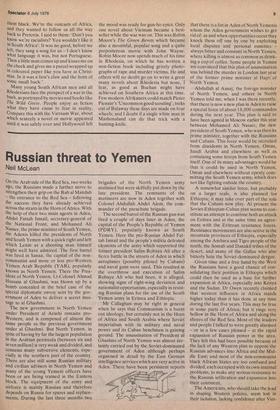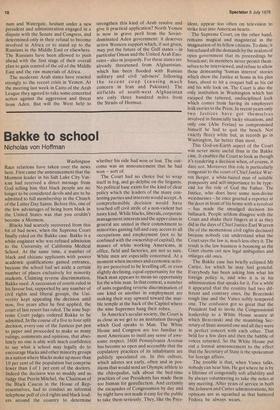Russian threat to Yemen
Neil McLean
On the Arab side of the Red Sea, two weeks ago, the Russians made a further move to strengthen their grip on the Bab al Mandab — the entrance to the Red Sea — following the success they have already achieved across the straits in the Horn of Africa. With the help of their two main agents in Aden, Abdel Fattah Ismail, secretary-general of the National Front, and Mohamed All Nasser, the prime minister of South Yemen, the Adenis killed the presidents of North and South Yemen with a quick right and left Which Lenin as a shooting man himself might well have admired. The first barrel was fired in Sanaa, the capital of the noncommunist and more or less pro-Western Yemen Arab Republic (YAR), popularly known as North Yemen. There the President of North Yemen, Lt-Colonel Ahmad Hussain al Ghashmi, was blown up by a bomb concealed in the brief case of the Special diplomatic envoy sent by the government of Aden to deliver a secret message to al Ghashmi.
The new government in North Yemen under President al Arashi remains proWestern, and is composed of almost the same people as the previous government under al Ghashmi. But North Yemen, in Spite of having by far the largest population in the Arabian peninsula (between six and seven million) is very weak and divided, and contains many subversive elements, especially in the southern part of the country. There are also still some Russian military and civilian advisers in North Yemen and many of the young Yemeni officers have been or are being trained in the Eastern block. The equipment of the army and airforce is mainly Russian and therefore depends on Russia for spares and replacements. During the last three months two brigades of the North Yemen army mutinied but were skilfully put down by the late president. The remnants of the mutineers are now in Aden together with Colonel Abdullah Abdel Alem, the commander of the parachute brigade.
The second barrel of the Russian gun was fired a couple of days later in Aden, the capital of the People's Republic of Yemen (PDRY), popularly known as South Yemen. Here the pro-Russian Abdel Fattah Ismail and the people's militia defeated elements of the army which supported the former president Salim Robaya Ali after a fierce battle in the streets of Aden in which aeroplanes (possibly piloted by Cubans) and naval guns were used. This resulted in the overthrow and execution of Salim Robaya All who had been, it is alleged, showing signs of right-wing deviation and nationalist opportunism, especially in resisting Russian plans for the use of the South Yemen army in Eritrea and Ethiopia.
Mr Callaghan may be right in general when he says that Communism is a burnt out ideology, but certainly not in the Horn of Africa and South Arabia where Soviet imperialism with its military and naval power and its Cuban henchmen is gaining ground. The assassination of President al Ghashmi of North Yemen was almost &rtainly carried out by the Soviet-dominated government of Aden although perhaps organised in detail by the East German intelligence services which are very active in Aden. There have been persistent reports that there is a list in Aden of North Yemenis whom the Aden government wishes to get rid of: as and when opportunities occur they knock them off one by one by exploiting local disputes and personal enmities — always bitter and constant in North Yemen, where killing is almost as common as drinking a cup of coffee. Some people in Yemen are convinced that this plan of assassination was behind the murder in London last year of the former prime minister al Hajri of North Yemen.
Abdullah al Asnaj, the foreign minister of North Yemen, and others in North Yemen told me, when I was there recently, that there is now a new plan in Aden to raise a special force of about 18,000 commandos during the next year. This plan is said to have been agreed in Moscow earlier this year between Mohamed Ali Nasser, the new president of South Yemen, who was then its prime minister, together with the Russians and Cubans. This force would be recruited from dissidents in North Yemen, Oman, Saudi Arabia and elsewhere as well as containing some troops from South Yemen itself. One of its many advantages would be that it could be used in North Yemen, Oman and elsewhere without openly committing the South Yemen army, which does not like fighting outside the country.
A somewhat similar force, but probably on a larger scale, is also planned for Ethiopia; it may take over part of the role that the Cubans now play. At present the Soviet-Ethiopian-Cuban plan seems to constitute an attempt to combine both an attack on Eritrea and at the same time an agreement with the Eritrean resistance forces. Resistance movements are also active in the mountain provinces of Ethiopia, especially among the Amhara and Tigre people of the north, the Somali and Danakil tribes of the desert, and many of the Gallas who also bitterly hate the Soviet-dominated dergue.
Given time and a free hand by the West the Russians have a good chance of consolidating their position in Ethiopia which could then be used as a base for further expansion in Africa, especially into Kenya and the Sudan. Dr Owen recently claimed that western ir.fluence in Africa stands higher today than it has done at any time during the last five years. This may be true in some parts of Africa; but it rings very hollow in the Horn of Africa and along the shores of the Red Sea. Most of the leaders and people I talked to were greatly alarmed — or in a few cases pleased — at the rapid expansion of Russian power in the area. They felt this had been possible because of the lack of any Western plan to oppose the Russian advances into Africa and the Middle East; and most of the non-communist black African States are too confused and divided, each occupied with its own internal problems, to make any serious resistance to the Russian infiltration and expansion into their continent.
The Americans, who should take the lead in shaping Western policies, seem lost in their isolation, lacking confidence after Viet nam and Watergate, hesitant under a new president and administration engaged in a dispute with the Senate and Congress, and determined only in their refusal to become involved in Africa or to stand up to the Russians in the Middle East or elsewhere. The Russians have been allowed to push ahead with the first stage of their overall plan to gain control of the oil of the Middle East and the raw materials of Africa.
The moderate Arab states have reacted strongly to the recent crisis in Yemen. At the meeting last week in Cairo of the Arab League they agreed to take some concerted action against the aggression and threat from Aden. But will the West help to strengthen this kind of Arab resolve and give it practical application? North Yemen is now in grave peril from the Sovietdominated Aden government: it deserves active Western support which, if not given, may put the future of the Gulf states — in particular Oman and the United Arab Emirates— also in jeopardy. For these states are already threatened from Afghanistan, which has been flooded with Russian military and civil 'advisers' following the recent coup (causing much concern in Iran and Pakistan). The airfields of south-west Afghanistan are only three hundred miles from the Straits of Hormuz.



































 Previous page
Previous page